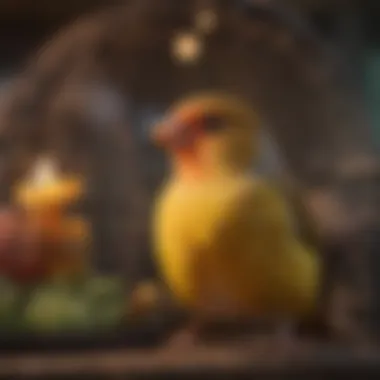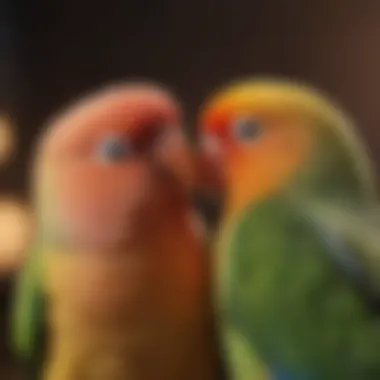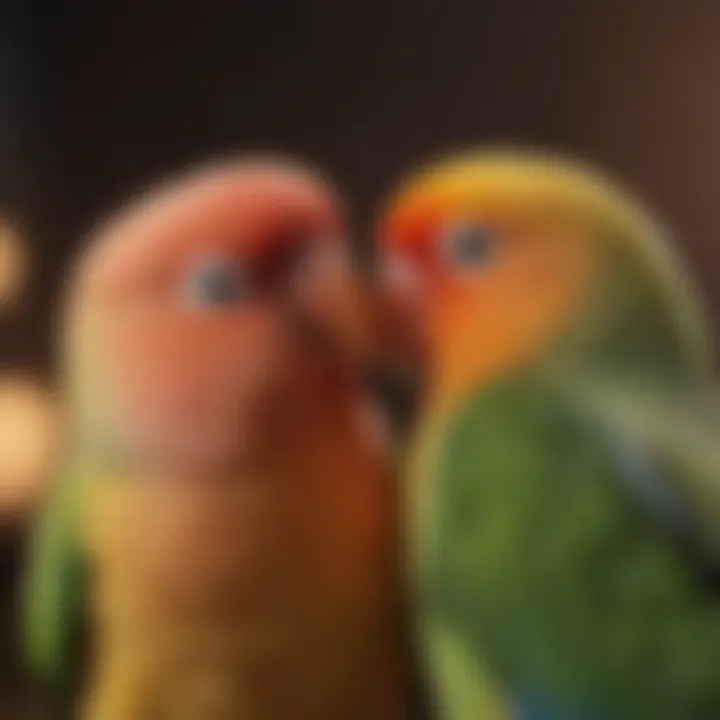Discover the Best Pet Birds for Your Home


Intro
Birds have long captured the hearts of many as affectionate companions. Their unique personalities, vibrant colors, and melodious songs add a special magic to our lives. However, choosing a pet bird is not just about aesthetics; it requires knowledge and understanding of their needs and behaviors. This guide dives deep into the realm of pet birds, focusing on providing insights for both seasoned enthusiasts and newcomers alike. Key topics explored include care tips, behavioral insights, nutritional guidance, health considerations, and enriching activities that can elevate the bird-keeping experience.
As birds are not just pets but intricate beings, a solid understanding of their natural behaviors and environmental needs is essential. Their emotional and physical well-being relies on responsible care. Each species comes with its own unique requirements, which will impact how you interact with your feathered friend. From parakeets and canaries to cockatiels and macaws, each bird species offers something special.
The aim of this guide is to empower potential bird owners with the knowledge they need to make informed decisions. By examining various aspects of bird care, we hope to create a supportive and rich experience for both the birds and their human companions.
Prelims to Pet Birds
The realm of pet birds is both expansive and intriguing, providing potential owners with a variety of options that serve as companionship and joy. Understanding this section is essential in the journey of becoming a bird owner. Pet birds possess unique traits that distinguish them from other animals, and appreciating these features can lead to a more satisfying relationship. Furthermore, being informed about their needs sets the foundation for proper care and lifelong companionship.
Understanding Avian Companionship
Avian companionship provides a unique dynamic compared to traditional pets like dogs or cats. Birds show affection and exhibit personality traits that can be surprisingly engaging. They communicate through vocalizations, body language, and social play. Each bird species brings its own social needs and signals, which makes understanding their companionship essential for an enriching experience. Owners often find that birds can bond closely, showcasing affection in their unique ways.
Engagement with birds goes beyond mere ownership; it involves a commitment to understanding their behavior, fostering trust, and providing an environment that caters to their social nature. Owners can enrich their relationships through skills like bird training, which not only enhances communication but also strengthens bonds. Thus, understanding avian companionship leads to a fulfilling relationship between bird and owner.
Why Choose a Pet Bird?
There are several compelling reasons to consider a pet bird for companionship. For many individuals, birds are appealing due to their colorful plumage, playful antics, and ability to mimic sounds, which can entertain and astound. Unlike larger pets, birds often require less space, which suits urban lifestyles or smaller homes. Additionally, many bird species have relatively low maintenance needs, making them accessible to a wide range of potential owners.
Moreover, birds can be very sociable at times, displaying affection and personality that many owners find delightful. Their ability to uplift moods through cheerful chirping or companionable presence is invaluable. It is important to evaluate one’s lifestyle, as each species has different requirements. Choosing the right bird species can enhance life, fostering joy and companionship.
"Birds can be remarkable companions, offering emotional support and enriching lives in unique ways."
In summary, the choice to keep a pet bird should be weighed thoughtfully, taking into account the distinct social needs and characteristics of different species. This intricate blend of companionship, understanding, and joy underpins the decision to embark on a rewarding journey with a pet bird.
Popular Pet Bird Species
In this section, we explore popular pet bird species that have charmed owners worldwide. Understanding these species is vital for anyone interested in adopting a bird. Each species brings unique traits and needs. This knowledge can aid in choosing a pet bird that fits your lifestyle and preferences.
Parakeets: The Colorful Companions
Parakeets, often known as budgerigars or budgies, are vibrant and sociable birds. Their playful nature makes them excellent companions. Parakeets come in various colors, adding beauty to any home. These small birds can be trained to mimic sounds and phrases, which can be entertaining for their owners.
Caring for parakeets involves providing a spacious cage, a balanced diet, and regular social interaction. Their diet should include high-quality pellets, fresh fruits, and vegetables. Parakeets thrive in social settings, so it is ideal to keep them in pairs or groups if possible.
Cockatiels: Charming and Vocal
Cockatiels are known for their charming personalities and beautiful crests. They often whistle and mimic sounds, making them quite vocal. These birds show a range of emotions. A cockatiel can become attached to its owner and may even lean into affection.
They require a balanced diet similar to parakeets but can also enjoy a variety of seeds. Important factors for their care include providing adequate exercise space and opportunities for social interaction. Cockatiels can easily become bored without stimulation.
Canaries: The Melodic Singers
Canaries are famous for their singing abilities. Males are particularly known for their melodious tunes, which make them popular among bird lovers. In terms of appearance, canaries come in various colors and patterns, but their vocal talents are what set them apart.
Canaries do not require social interaction like parakeets or cockatiels. However, they still need a spacious cage and a nutritious diet rich in seeds and greens. Regular cleaning of their habitat is crucial to keep them healthy.
Lovebirds: Affectionate and Social


Lovebirds are small, affectionate birds. Their name derives from their strong pair bonding behavior. They thrive in pairs and are known for their playful antics. Lovebirds express affection through nuzzling and playful interactions.
These birds require substantial social engagement. Their care involves providing a diverse diet, including pellets, seeds, fruits, and vegetables. A spacious cage with toys is essential to keep them entertained. Regular human interaction enhances their social development.
African Grey Parrots: Intelligent Companions
African Grey Parrots are recognized for their intelligence and exceptional mimicry skills. They can learn a large vocabulary, which makes them fascinating pets. The bond they form with their owners can be profound. They require mental stimulation and social interaction to thrive.
Caring for African Greys involves a diverse diet that includes pellets, fruits, and vegetables. Owners should provide plenty of toys and opportunities for mental engagement. Regular veterinary check-ups are important to maintain their health. These parrots can live for decades, making a long-term commitment necessary.
Understanding the unique characteristics of these pet bird species is crucial for successful avian companionship. Each bird requires individual care and understanding to thrive in a home environment.
Factors to Consider Before Choosing a Pet Bird
Selecting a pet bird involves more than just picking a colorful creature from the pet store. It requires careful consideration of several factors. Each of these considerations plays a crucial role in ensuring that both the bird and the owner will enjoy a happy and fulfilling experience. In this section, we will examine the most significant factors, including space requirements, noise levels, and time commitment. These aspects can greatly influence the choice of a pet bird and its adaptation to a new environment.
Space Requirements
When it comes to pet birds, space is not just a luxury; it is a necessity. The size of the cage and the area where the bird will spend most of its time must be considered. Different species have varying needs when it comes to space. For instance, larger birds like African Grey Parrots require substantially more space than smaller ones like finches.
- Cage Size: A general rule is that the cage should be at least wider than the bird’s wingspan when fully extended. Additionally, height is important for birds that enjoy climbing.
- Flight Space: Birds need to stretch their wings and exercise. A room where they can safely fly around is ideal. Ensure that windows are secured and there are no potential hazards.
- Perches and Toys: Adequate space for perches and toys is essential for physical and mental stimulation. Only crowded cages can lead to stress and behavioral issues.
Considering these spatial requirements will not only benefit the bird’s well-being but also enhance the interaction between the owner and the bird.
Noise Levels and Living Situations
Noise can become a significant concern for many prospective bird owners. Birds are naturally vocal creatures, and their calls vary significantly across species. Understanding the noise levels associated with different types of birds is critical before making a choice.
- Species Specificity: Some species, like Cockatiels and Lovebirds, are known for their more moderate levels of noise, while others, like Macaws and African Grey Parrots, can be quite loud.
- Living Arrangements: Consider the living situation. For instance, if you live in an apartment with thin walls, a loud bird might not be the best fit. Likewise, families with young children may need a bird that is tolerant of noise and commotion.
- Training and Socialization: Training plays a role in managing noise levels. Birds can be trained to reduce excessive vocalization through positive reinforcement.
Being aware of these factors helps prevent misunderstandings and ensures harmony between the bird and its environment.
Time Commitment for Care
Time commitment is an often overlooked factor when choosing a pet bird. Birds are not low-maintenance pets; they require regular care and interaction.
- Daily Interaction: Birds thrive on social interaction. They require daily time outside of their cage, allowing for play, training, and bonding. Failing to provide this can lead to behavioral problems.
- Feeding and Cleaning: Birds need a balanced diet that's tailored to their species. Additionally, cages require regular cleaning to maintain hygiene and health.
- Veterinary Care: Routine vet visits are essential. Recognizing when a bird is unwell may require time spent observing its behavior and habits.
The time and effort involved can be substantial, but a well-cared-for bird contributes much joy to the household.
Proper planning and reflection on these critical factors can lead to a successful and rewarding experience for both the bird and the owner.
Essential Bird Care Practices
Providing proper care for pet birds is vital for their overall well-being and happiness. Understanding essential bird care practices enables pet owners to create a nurturing environment that fosters health and companionship. Each bird species has unique needs, and addressing these requirements assures that they thrive in a domestic setting. This section will cover the core aspects of bird care, focusing specifically on their nutritional needs, habitat setup, and the importance of social interaction.
Nutrition and Diet Essentials
Nutrition is the cornerstone of good health for pet birds. A balanced diet aids in maintaining their energy levels, plumage, and general wellness. Different species have varied dietary requirements. For instance, seed diets might not contain the essential nutrients that birds need. A diet rich in fresh fruits, vegetables, pellets, and seeds is recommended for most companion birds. Here are some key points for proper avian nutrition:
- Variety is Key: Varying the diet helps to prevent boredom and encourages natural foraging behavior.
- Pellets Over Seeds: High-quality pellets constitute a complete diet for many birds. Ensure they are formulated specifically for your bird’s species.
- Fresh Foods: Include a selection of fruits and vegetables to provide natural vitamins and minerals.
- Avoid Harmful Foods: Certain food items like avocado, chocolate, and caffeine are toxic to birds.


Regularly monitoring food intake and ensuring clean water is available contributes to long-term health.
Cage and Habitat Setup
Creating a suitable habitat for a pet bird is fundamental to its welfare. A well-arranged cage can reduce stress and provide security. Factors to consider include:
- Cage Size: Choose a cage that allows your bird enough space to move, spread its wings, and climb.
- Bar Spacing: The spacing should be appropriate for the species, ensuring they cannot escape or become trapped.
- Perches and Toys: Include various perches at differing heights and textures. Toys stimulate their minds and prevent boredom.
- Clean Environment: Regular cleaning of the cage and surrounding area prevents illness and maintains hygiene.
Environmental factors, such as light and temperature, should also be optimized to create a comfortable living space.
Social Interaction and Enrichment
Birds are highly social creatures that thrive on interaction. They require mental stimulation and social engagement to lead fulfilling lives. Owners must incorporate various activities that promote bonding and enrichment:
- Daily Interaction: Spend time with your bird, talking to it or allowing it to play outside of the cage under supervision.
- Training Sessions: Simple training exercises can improve trust and communication between you and your pet.
- Environmental Enrichment: Change the layout of their cage, introduce new toys regularly, and consider natural wood branches for climbing.
Birds that lack interaction may develop behavioral problems, which can lead to stress and health issues. Ensuring a stimulating and engaging environment is crucial.
Proper care practices create a foundation for a happy and healthy life for your pet bird.
These essential bird care practices will significantly improve your relationship with your pet, enhancing both your lives. Understanding and implementing these practices will lead to a successful bonding experience.
Health and Wellness for Pet Birds
Maintaining health and wellness in pet birds is critical for both their longevity and happiness. Healthy birds exhibit lively behavior, clear vocalizations, and bright plumage. Conversely, neglected health can lead to serious issues that not only affect the birds but can also impact their owners. Understanding health and wellness goes beyond merely observing symptoms. It includes recognizing the overall needs and requirements of avian companions.
Signs of a Healthy Bird
Identifying a healthy bird is crucial for any bird owner. There are several signs that indicate wellness:
- Bright Eyes: A healthy bird generally has clear, bright eyes without discharge.
- Active Behavior: A lively pet bird is often either engaging with its environment or resting normally when not active.
- Clean Feathers: The plumage should be clean, well-groomed, and free from matting.
- Healthy Appetite: Regular feeding habits and a consistent interest in food are key indicators of good health.
- Vocalizations: Depending on the species, appropriate vocalizations show that the bird is comfortable and healthy.
All these factors combined give a comprehensive picture of health that should be monitored routinely to catch any potential issues early on.
Common Health Issues
Pet birds can face a range of health problems. Common issues include:
- Obesity: Many pet birds suffer from obesity due to overfeeding and lack of exercise. This can lead to serious health problems.
- Feather-plucking: Stress or boredom can result in feather-plucking, which has both physical and psychological implications.
- Respiratory Issues: Birds are sensitive to pollutants in the air. Symptoms like discharge and coughing should not be ignored.
- Crop Problems: Blockages or infections can manifest as changes in appetite or unusual behavior.
Recognizing these issues early on is vital for taking corrective action and ensuring your bird’s well-being.
Preventative Care and Vet Visits
Preventative care forms the backbone of a healthy avian lifestyle. Regular veterinary check-ups are essential for early detection of issues. Owners should schedule visits at least once a year. A few key points for effective preventative care include:
- Routine Check-ups: Regular vet visits can identify underlying problems before they become severe.
- Vaccinations: Some birds may require vaccinations to avoid common avian diseases.
- Proper Nutrition: Providing a balanced diet helps build a strong immune system.
"Preventative wellness is always less costly than treatment after illness."
- Environmental Safety: Keep their cage clean and make sure the living area is free from harmful chemicals.


Well-maintained health not only prolongs the life of your pet bird, but enriches the bond between the owner and the bird.
Fostering a Positive Relationship with Your Bird
Creating a strong bond with your pet bird is essential for a fulfilling companionship. When a bird feels safe and secure, it exhibits healthier behaviors and is more likely to engage positively with its owner. Fostering a positive relationship encourages not only trust but enhances the overall experience of bird ownership. Birds are intelligent animals, and a solid bond with them can lead to lifelong friendships. This section highlights key aspects to developing a nurturing relationship with your avian companion.
Understanding Bird Behavior
To build a connection, it is crucial to understand how birds communicate and behave. Each species has unique traits, but there are general behaviors that can guide you. Birds express emotions through body language and vocalizations. For example, a bird that raises its feathers might be showing excitement or aggression.
By paying attention to these signals, a bird owner can create a better environment for interaction. Recognizing when your bird is happy, scared, or anxious helps in addressing its needs. This leads to enhanced trust and reduces stress for both parties.
In addition to body language, vocalizations play an important role. Parrots, for example, are known for their ability to mimic sounds and develop a personal language with their owners. Understanding what these sounds mean can assist in strengthening your bond with your bird.
Training Techniques for Better Interaction
Training is a key element in fostering a positive relationship. Effective training techniques are not just about teaching tricks; they enhance communication. Using positive reinforcement methods, such as treats or praise, encourages desired behaviors. This creates a motivating experience for your bird.
Some techniques include:
- Step-up Command: Teach your bird to step onto your finger or hand. This simple command establishes trust and enables physical interaction.
- Target Training: Use a stick or a finger as a target for your bird to touch. This technique not only stimulates your bird mentally but also improves its willingness to engage.
- Clicker Training: A clicker can be an effective tool for training. The click sound signals a reward is coming, reinforcing positive behavior.
Consistency is important. Regular training sessions keep your bird engaged, and the bond deepens with time spent together.
Building Trust and Bonding
Trust is essential for a lasting relationship with your bird. Establishing a routine helps birds feel secure. Regular feeding times, play sessions, and gentle handling can increase assurance. Spend time simply being close without forcing interaction. Allow your bird to approach you at its own pace.
Here are some tips to help build trust:
- Respect Boundaries: Always observe your bird's reactions to handling or proximity. If it shows signs of stress—like backing away—give it space.
- Gentle Touch: Use soft and slow movements to avoid startling your bird. Stroke it gently and observe how it responds.
- Create Safe Spaces: Make sure your bird has a space it can retreat to when it feels overwhelmed. This helps it associate you with safety and security.
Research indicates that spending quality time with your bird substantially increases trust and strengthens the bond between owner and pet.
Fostering a positive relationship with your bird requires patience and understanding. By exploring its behavior, employing effective training methods, and building trust, you create a nurturing environment. This not only benefits the bird but enhances the joy of pet ownership.
Culmination: Selecting the Right Pet Bird
Choosing the right pet bird is a significant decision that can impact your life in many ways. Birds can be engaging companions, each bringing unique traits and behaviors. This selection is not merely about aesthetics or size but also involves understanding their specific needs and compatibility with your lifestyle.
It is crucial to consider your personal circumstances, such as the space available, noise tolerance, and time you can dedicate to care. Each species comes with its own set of requirements regarding diet, exercise, and social interaction. Therefore, being informed empowers prospective owners to make choices that foster harmonious relationships with their birds. The goal is to ensure a happy and healthy environment for both the owner and the pet.
Another important factor is the commitment involved. Birds often have long lifespans, especially larger species. Understanding the long-term nature of this responsibility can help avoid regrettable decisions. Furthermore, every bird’s behavior can be unpredictable, necessitating patience and understanding to nurture a positive bond.
Ultimately, the joy derived from a pet bird can be substantial. With careful consideration and preparation, potential owners can ensure a rewarding companionship that enriches their lives.
Final Considerations for Prospective Owners
Before deciding on a pet bird, here are some essential factors that should not be overlooked:
- Time and Commitment: Birds need significant daily interaction and mental stimulation. Ensure you can allocate enough time to engage with your bird, as they thrive on social interaction.
- Space and Housing: Assess the space you have for a bird's cage. Larger birds require more room, both for their cage and for time outside.
- Budget for Care: Owning a pet bird involves ongoing costs like food, vet visits, and supplies. Make sure your financial situation can support these expenses over time.
- Compatibility: Research different species to see which aligns with your lifestyle and preferences. Some prefer quiet environments, while others may be more vocal and social.
Resources for Further Information
To expand your knowledge about pet birds, consider these resources:
- Wikipedia's Bird Article: A comprehensive overview of birds, including various species and their care needs.
- Britannica: A reliable source for in-depth articles on avian characteristics and habitats.
- Reddit Bird Community: Engage with fellow bird enthusiasts for personal experiences and advice.
- Facebook Bird Groups: Connect with online communities dedicated to pet bird ownership, training, and care.
Establishing a well-informed decision about which bird suits you best can lead to a fulfilling relationship that lasts for years. Therefore, take your time researching, understanding, and envisioning the future with your potential feathery companion.















